- Home
- Chris Ryan
Agent 21: Codebreaker: Book 3 Page 2
Agent 21: Codebreaker: Book 3 Read online
Page 2
The end, when it came, was a mercy. Not just for Amelia Howard, but for everybody else in her carriage, who just happened to be in the wrong place, at the wrong time.
The emergency services were speedy and efficient. But there was very little they could do.
Within minutes of the blast, the entire tube network had been evacuated. A cordon had been fixed around Pimlico Station. Ambulances, police cars and fire appliances clogged the surrounding roads, and the sirens of others approaching filled the air. Rescue workers wearing hard hats and oxygen masks bravely strode down the underpass that led into the station. Others walked out, their clothes and skin covered in grime and their faces utterly shocked. None of them had ever seen such sights before.
There were other vehicles too. Unmarked SUVs from which plainclothes anti-terrorist officers exited with grim faces. Helicopters circled up above. A news crew had already arrived and was forcing its way through the crowd of onlookers standing by the cordon while five police officers shouted at them to keep their distance. One man, however – he had shoulder-length grey hair, green eyes and smelled of cherry tobacco – approached the cordon, lifted it over his head and stepped towards the blast site. A police officer ran up to him and was clearly just about to scream at him to get back behind the cordon when the man waved an ID card in his face.
The police officer’s eyes widened and he stood almost to attention. ‘All right, sir. Please go on.’
The grey-haired man gave the policeman a vague nod, then continued towards the underpass. When he was five metres away, he stopped. He looked lost in thought as he watched the fledgling rescue operation unfold. When it became clear that the emergency services were not carrying out the living on their stretchers, but the dead, he bowed his head, sighed and walked back to the cordon.
‘Can I be of assistance, Mr Bartholomew?’ asked the officer who had tried to stop him coming in.
Mr Bartholomew smiled a wan, thankful smile. ‘No,’ he said. ‘Go back to your position.’
And as he walked away, the collar of his coat pulled up against the early morning chill, he thought, but did not say: Nobody can do anything for the poor souls down there now. It’s the living who need our help.
2
ADVANCE/RETREAT
ON A BLEAK, remote island somewhere off the northern coast of Scotland, a lesson was taking place. The pupil was no longer a boy, but not yet a man. He had an adult’s responsibilities, however. Some days they weighed more heavily on his shoulders than others. Today was one of those days.
Zak Darke’s body ached. As Amelia Howard had been making her final journey from Brixton tube station, and most other boys his age had been drowsily hoping for a few more minutes’ sleep before school, Zak had been starting his punishing daily workout. After that kind of beasting, most people would take the day off. Not Zak. His day was only just beginning.
The room in which the lesson was taking place was on the ground floor of St Peter’s House, the desolate stone mansion that the boy had come to think of as home. There was a circular oak table in the middle of the room, and floor-to-ceiling windows that looked out over a windswept landscape towards a choppy grey ocean. Zak stood at the window, staring out to sea. Unlike most students, whose distant gazes meant they were bored, Zak was deep in thought as he watched the rain whipping the remote island of St Peter’s Crag. It was the middle of June, but the seasons meant nothing here. It seemed to rain all the time. There were no other pupils in this classroom, but there were two teachers: a young woman with white-blonde, shoulder-length hair, and a rugged-looking man, also blond and with a plain, square face and a flat nose. Since the death of Zak’s parents in Africa – innocent victims of a vicious drugs magnate – and his recruitment as an agent, Gabs and Raf, Zak’s Guardian Angels, had become his instructors, protectors and family all rolled into one. They both sat at the oak table.
‘Nice hairpin,’ Zak said to Gabs as he wandered back to the table.
Gabs’s fingers reached up to touch the pin clipped to her hair. It was the size of a fifty-pence coin and fashioned in the shape of a star. ‘Flattery will get you everywhere, sweetie,’ she said, a flicker of pleasure crossing her lips. ‘But how about we stay focused on our lesson, hey?’
Zak inclined his head. ‘I still don’t get it,’ he said. ‘How could they just let people die?’
‘Because sometimes in war you have to make difficult decisions,’ said Raf with a shrug. ‘Don’t tell me that’s news to you.’
‘I’ve never been in a war.’ Zak knew he sounded grumpy, but he couldn’t help it. This particular lesson was leaving a bad taste in his mouth.
Gabs gave him a gentle smile. ‘Wrong, Zak,’ she said. ‘You’ve just never been in the army. People like us are at war all the time. Nobody reads about it in the newspapers, but that doesn’t mean it isn’t happening.’
Zak sighed, stood up and started pacing around the room. ‘So let me get this straight,’ he said. ‘It’s the Second World War and the Germans have a secret code called Enigma that the British have managed to crack. British Intelligence intercepts a message stating that the Germans are about to bomb Coventry. If they evacuate the city, the Germans will realize they’ve cracked the Enigma, so they allow the bombing to go ahead and hundreds of people to die.’
‘In a nutshell, yes,’ said Raf.
Zak shook his head. ‘It’s wrong,’ he stated.
‘It saved lives in the long run. If the Germans had worked out that the British had cracked the Enigma code, we’d probably have lost the war.’
‘It’s still wrong.’
‘Maybe we should just move on,’ Gabs suggested. ‘Nobody really knows if that story’s true, anyway. Raf was only telling you to illustrate a point.’
‘What point?’
‘That codes are important. Governments and intelligence agencies spend millions every year on encryption and decryption software more advanced than a human mind could ever hope to achieve. Phone calls across the Atlantic are constantly monitored for trigger words. And, of course, the same goes for emails. To avoid it, you need very advanced encryption. When you’re in the field, though, you’re unlikely to have access to that kind of technology. You need to know how to send messages safely, and have a fighting chance of decoding enemy communications if need be.’
Zak nodded. He was feeling cross with his Guardian Angels, but he didn’t know why. It wasn’t like the bombing of Coventry more than seventy years ago was their fault, but he couldn’t help wondering whether they – or their handler Michael, whose office this was but who never seemed to appear unless he had a job for Zak – would consider him dispensable if it meant saving others. Michael viewed the world a bit differently to most people, after all.
Zak put the thought from his mind. He was being childish. Not for the first time, he reminded himself that he had chosen this life. Just like the other young agents, one of whom he had already met in the field, had. Nobody had forced any of them into it. Though, he mused, it was hard to leave once in. Apart from anything else, he was officially dead, buried in a cemetery in north London, where he had once lived.
‘With all that in mind, I’m now going to teach you a perfect cipher,’ Gabs said. ‘Easy to use, impossible to crack, even with infinite computing power.’
Zak gave Gabs a sceptical look. They had already spent the previous day working on codes – everything from Morse codes to written substitution codes or number codes. Why would this be any different?
‘That doesn’t sound very likely to me, Gabs,’ he said as he retook his place at the table. He knew something about computers too; he had faith in their abilities.
There was a piece of blank paper on the table, and a pencil. Gabs started to write with a twinkle in her eye. ‘Trust me,’ she said. ‘This method is called the one-time pad. It was used by the Special Operations Executive during the Second World War and any sensitive military unit will be trained in some form of this. It’s been mathematically proven to be unbreakable so
long as you use it correctly.’ She continued scribbling for a minute, then passed the sheet of paper over to Zak. Along the top of the paper, Gabs had written the alphabet, with a number below each letter.
Below this, she had written what looked like random groups of letters:
‘Each number represents a letter, OK?’
Zak nodded.
‘The random letters below – the line beginning with a “J” – are the key, and it has to be as long as, or longer than, the message you want to send. The person writing the code and the person deciphering it need this key. Let’s say we want to send an order to advance. First of all, you write the message directly underneath the code.’
‘Then you convert the letters to numbers and add them up. If the number you get is more than twenty-five, you count from zero again. See? The third letter is seven plus twenty-one, which equals twenty-eight: that’s twenty-five plus the zero plus two. So the decoded number to turn into a letter is a two.’
‘Finally, convert these final numbers back into letters.’ Gabs did this and wrote them down.
‘So, using the random key JEHFYJD, the word ADVANCE becomes JHCFLLH. To decipher it, you simply need to do the same thing in reverse – convert the coded message and the cipher to numbers and subtract the cipher number from the message number. Don’t forget to include the zero if the top number needs to be increased by twenty-five. Look at the third number again. Two minus seven. Add the twenty-five and the zero – that’s twenty-six numbers in total – to the two and you get twenty-eight minus seven. Twenty-one. V. Got it?’
Zak stared at the numbers and letters on the page. It seemed too straightforward to be unbreakable.
It was almost like Gabs was reading his mind. ‘Most letter-based ciphers can be broken because we know how often certain letters appear in the English language. The beauty of the one-time pad is that the same letter in the original message can become different letters when it’s enciphered. Look – the word ADVANCE has two As in it – the first one has become a J, the second one has become an F.’ Gabs’s eyes twinkled. ‘I once told a boy I’d go out with him if he cracked a code I’d written with a one-time pad. He thought he was a bit of a brainbox, see. Bit unfair, really, with it being impossible and all, but I didn’t really fancy him anyway.’ She winked at Zak.
‘So,’ she continued, ‘the killer feature of the one-time pad is that any letter can be turned into any other, depending on the key, which makes it impossible for the enemy to guess what you’re saying. Try deciphering our encoded message of the word ADVANCE – JHCFLLH – using this random key instead.’ Gabs handed him a piece of paper with the following letters: SDJOHLO
Zak carefully deciphered the original code using this new key. To his surprise, it revealed a very different message: RETREAT.
Gabs smiled at his obvious astonishment. ‘It’s not perfect, of course,’ she said. ‘You can only use the cipher key once, and because it has to be a long, random string of letters, it’s practically impossible to remember so both people using it have to write it down. But as long as the key doesn’t fall into enemy hands, the one-time pad is completely secure.’
Zak took a few moments to absorb all of that, then he looked up at Gabs and grinned. ‘Nice,’ he said.
‘The one-time pad is unbreakable, but awkward to use. There are other similar methods we’ll teach you that sacrifice a little security for a lot of convenience, but the important thing to remember is this: don’t get so blinded by technology that you forget the simpler ways of doing things. Sometimes they’re the best.’
‘And it’s sobering to think,’ Raf added, ‘that if the Germans had used one-time pads instead of Enigma, it might not just have been Coventry that fell, but Britain too.’
‘Sobering indeed,’ a new voice announced.
Zak looked around sharply. The new voice had no body, and it seemed to echo slightly around the room.
‘I’m glad to see that Gabriella and Raphael are not neglecting your history tuition. The past can tell us a great deal about the future, Zak. We’re in a privileged position, if we can learn from other people’s mistakes. That’s a charming hairpin, if I may say so, Gabriella.’
Zak realized that the new voice came from circular speakers embedded in the ceiling, and he recognized it as belonging to Michael, the mysterious old man who had recruited him in the first place and who controlled the missions he was sent on. He noticed that Raf’s and Gabs’s faces instantly grew sharp. Gabs stood up, walked towards the door and flicked a switch on the wall. A hatch in the ceiling that Zak had never noticed before opened up, and a screen descended silently along the oak-panelled wall opposite the windows. Michael was on-camera, sitting behind an empty glass desk in front of a bare beige wall, with no clue as to where he was in reality. Zak had no idea where his handler went when he wasn’t here on St Peter’s Crag; he was pretty sure that Michael intended to keep it that way.
‘Your studies are going well?’ Michael asked.
Zak nodded.
If Michael noticed that he was quieter than normal, he didn’t mention it. He just smiled again before continuing to speak. ‘I wonder if I might ask you to switch on the television?’ he said. It was framed as a polite question, but of course it was anything but.
The TV was in the corner of the room. It was almost never switched on, but now Raf strode over, pressed a button on the side and it flickered into life. And for the next couple of minutes, the sound of the television filled the room, and silenced its occupants.
‘You join us at the scene of the devastating blast at Pimlico underground station.’ The young news reporter was slightly wild in the eyes, and breathless. ‘Rescue workers are still trying to gain access to the platform where it is thought that an explosive device was triggered by the arrival of the first train, a little before six o’clock this morning. As yet, no contact has been made with the driver or any of the passengers. It appears unlikely, however, that there are any survivors.’
The camera panned round to a scene of absolute confusion. The whole area was cordoned off and there were countless emergency vehicles. Zak caught sight of grim-faced men in yellow hard hats disappearing down the underpass that led into the station, and a crowd of anxious onlookers had congregated nearby, some of them weeping.
‘My information is a little more up-to-date than our delightful correspondent’s,’ Michael said. ‘I think we’ve seen enough, Raf?’
Raf switched the off TV, and they all looked back up to the screen that showed Michael’s face.
‘My sources tell me that the arrival of the first Victoria Line train into Pimlico triggered the detonation of approximately twenty-five kilograms of C4 plastic explosive.’
Gabs gave a low whistle.
‘My thoughts exactly, Gabriella. If there are any survivors, it will be nothing short of a miracle.’
The screen flickered. Michael disappeared and was replaced by some grainy camera footage. It took a moment for Zak to realize that he was looking at CCTV footage of Pimlico Station. The time code at the bottom of the screen told him that the footage was taken at 0231hrs. The platform was empty.
The screen juddered. Zak immediately noticed that the timecode had changed to 0145hrs.
‘Hey, what just happened?’
‘Oldest trick in the book,’ Gabs murmured. ‘Record some innocent CCTV footage, then superimpose it over the live feed when you want to camouflage yourself. Chances of someone noticing are tiny.’ She raised her voice and addressed Michael. ‘I take it, then, that the device was planted between 0145 hours and 0230 hours? Forty-five minutes isn’t long for a job like that. Whoever it was really knew what they were doing.’
‘My thoughts precisely,’ Michael’s voice replied. ‘But there’s more. We had a tip-off approximately five hours before the blast that this would happen.’
‘Who from?’ Raf asked.
The image on the screen changed for a second time. A photograph of a boy about Zak’s own age. He had a thin face, grea
sy brown hair and a protruding Adam’s apple. His glasses had brown frames and the lenses were so strong that they distorted his eyes slightly. There was wispy hair on his upper lip – he needed to shave, but had clearly never done so. He didn’t look like someone you’d want to spend a lot of time with.
‘Meet Malcolm Mann,’ Michael said. ‘Manny to his friends, although I’m reliably informed he doesn’t have many of those. Certainly not in his current place of residence – Harrington Secure Hospital in South London.’
Michael appeared on the screen again. ‘Young Malcolm is a remarkable individual.’ He coughed apologetically. ‘More remarkable than he looks. Six months ago, in one day, he successfully broke into the securest sections of the CIA, Pentagon and Department of Defense intranets. He did it securely – so securely that nobody would ever have traced it back to him if he hadn’t boasted about what he’d done on his personal blog. Needless to say, all traces of his actions have now been removed and classified under the Official Secrets Act – no press reports. That would have been most damaging to the security of our two nations.’
‘Why would he boast about it online?’ Zak asked.
‘You can read the psychiatric evaluations if you need to. The bottom line is that he’s different to most people. Different, but brilliant. Socially awkward, but with a mind like a computer. Astonishing powers of analysis, able to see patterns where nobody else can. However, our American cousins would like his head on a plate. They want to make an example of him, you see, to put him on trial for breaching their security. It’s all rather foolish, of course. If I was them, I’d be offering him a job.’ He looked thoughtful. ‘As a matter of fact, I still might.’

 Global Strike
Global Strike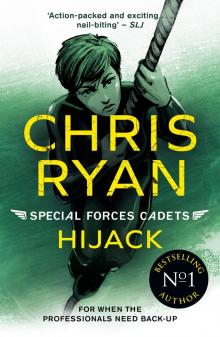 Hijack
Hijack Special Forces Cadets 2
Special Forces Cadets 2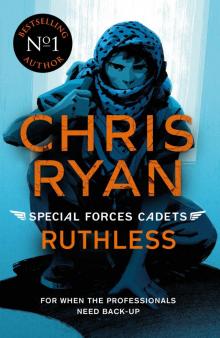 Ruthless
Ruthless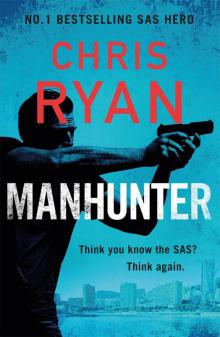 Manhunter
Manhunter Special Forces Cadets 1
Special Forces Cadets 1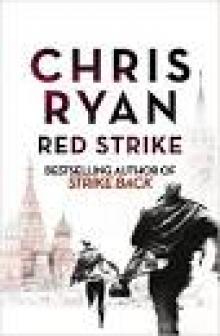 Red Strike
Red Strike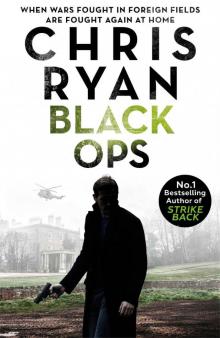 Black Ops
Black Ops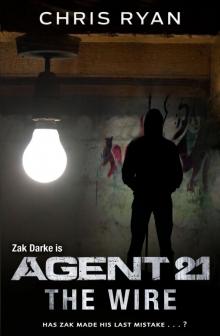 Agent 21: The Wire
Agent 21: The Wire Land of Fire
Land of Fire Alpha Force: Fault Line
Alpha Force: Fault Line Under Cover (Agent 21)
Under Cover (Agent 21)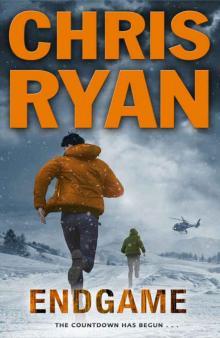 Endgame (Agent 21)
Endgame (Agent 21) Red Centre
Red Centre Blackout
Blackout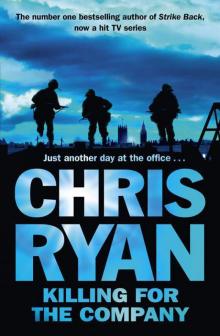 Killing for the Company
Killing for the Company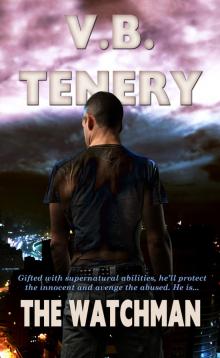 The Watchman
The Watchman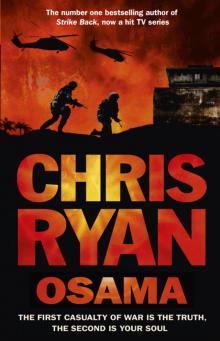 Osama
Osama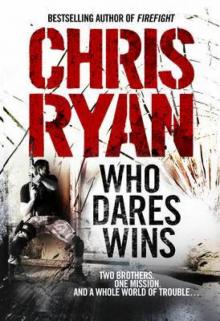 Who Dares Wins
Who Dares Wins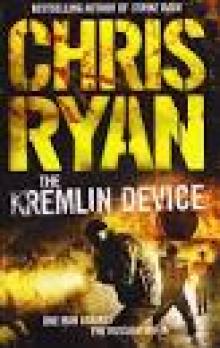 The Kremlin Device
The Kremlin Device Hunter Killer
Hunter Killer Alpha Force: Untouchable
Alpha Force: Untouchable Stand By Stand By
Stand By Stand By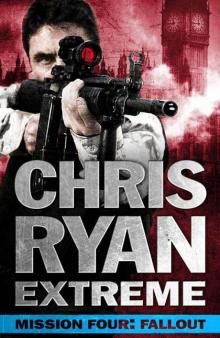 Chris Ryan Extreme: Hard Target: Mission Four: Fallout
Chris Ryan Extreme: Hard Target: Mission Four: Fallout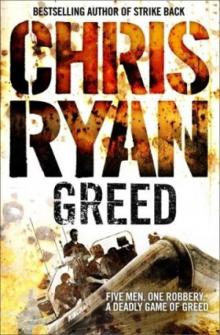 Greed mb-1
Greed mb-1 Alpha Force: Desert Pursuit
Alpha Force: Desert Pursuit Strike Back
Strike Back Greed
Greed The Bay Bulls Standoff
The Bay Bulls Standoff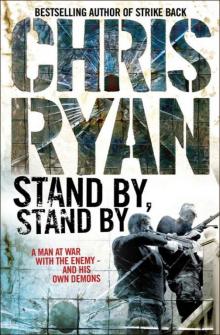 Stand By, Stand By gs-1
Stand By, Stand By gs-1 Outbreak
Outbreak Hunted
Hunted Vortex cr-4
Vortex cr-4 Rat-Catcher
Rat-Catcher Vortex
Vortex Bad Soldier
Bad Soldier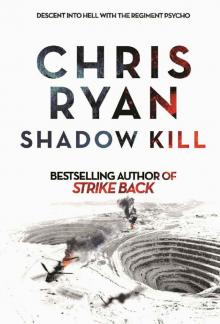 Shadow Kill: A Strikeback Novel
Shadow Kill: A Strikeback Novel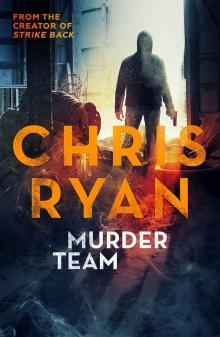 Murder Team (Kindle Single)
Murder Team (Kindle Single) One Good Turn
One Good Turn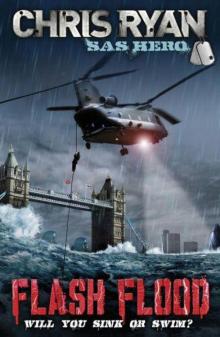 Flash Flood cr-1
Flash Flood cr-1 Night Strike
Night Strike Wildfire
Wildfire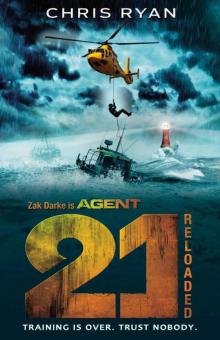 Agent 21: Reloaded: Book 2
Agent 21: Reloaded: Book 2 Chris Ryan Extreme: Hard Target: Mission Two: The Rock
Chris Ryan Extreme: Hard Target: Mission Two: The Rock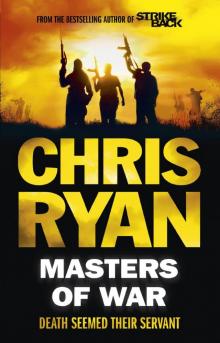 Masters of War
Masters of War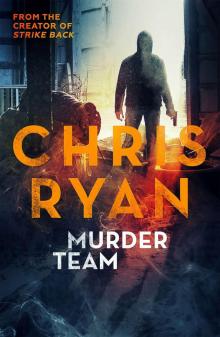 Murder Team
Murder Team War Dog
War Dog Wildfire cr-2
Wildfire cr-2 Survival
Survival The One That Got Away - Junior edition
The One That Got Away - Junior edition The Hit List
The Hit List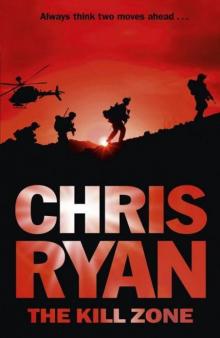 The Kill Zone
The Kill Zone Medal of Honor
Medal of Honor Battleground
Battleground Twister
Twister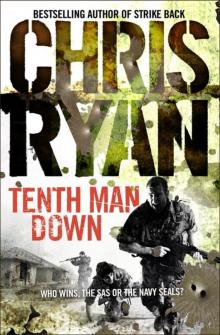 Tenth Man Down gs-4
Tenth Man Down gs-4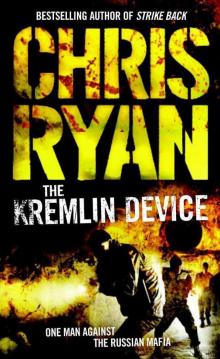 The Kremlin Device gs-3
The Kremlin Device gs-3 Hostage
Hostage Bad Soldier: Danny Black Thriller 4
Bad Soldier: Danny Black Thriller 4 Alpha Force: Blood Money
Alpha Force: Blood Money Firefight
Firefight Chris Ryan Extreme: Hard Target: Mission One: Redeemer
Chris Ryan Extreme: Hard Target: Mission One: Redeemer Hit List
Hit List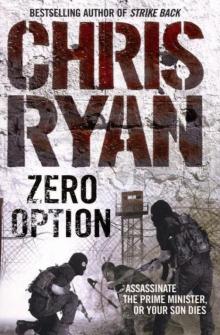 Zero Option gs-2
Zero Option gs-2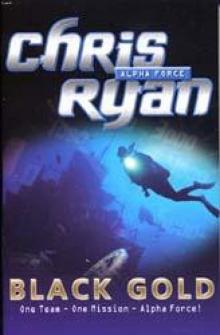 Black Gold
Black Gold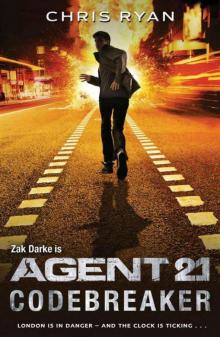 Agent 21: Codebreaker: Book 3
Agent 21: Codebreaker: Book 3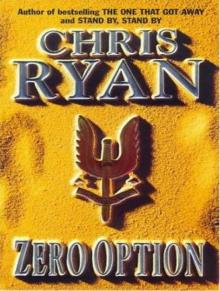 Zero Option
Zero Option Ultimate Weapon
Ultimate Weapon Tenth Man Down
Tenth Man Down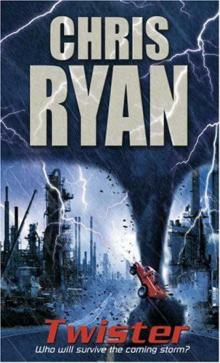 Twister cr-5
Twister cr-5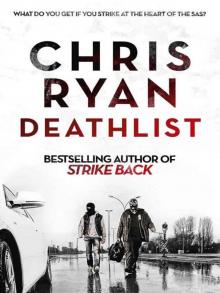 Deathlist
Deathlist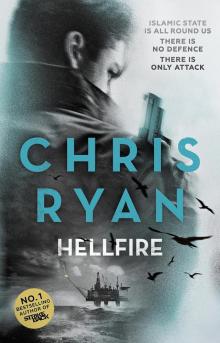 Hellfire
Hellfire Flash Flood
Flash Flood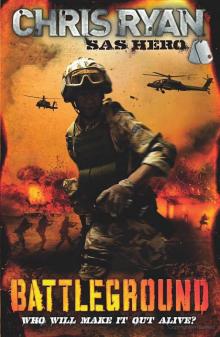 Battleground cr-6
Battleground cr-6 The Increment
The Increment